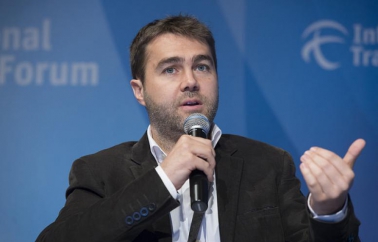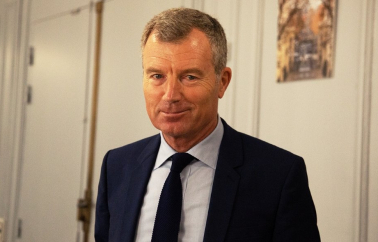
European start-ups catching up with Silicon Valley ( Source La Tribune.fr via Euractiv.fr)
European start-ups catching up with Silicon Valley
La Tribune by Sylvain Rolland translated by Samuel White
November, 05th 2015
PHOTO : Frederic Mazzella, the founder of Blablacar. [TechCrunch/Flickr]
Recent studies of European start-ups have found companies thriving in an increasingly favourable business environment, distinguishing themselves from their American competitors. Our partner La Tribune reports.
The European innovation ecosystem is gradually emerging from the long shadow cast by Silicon Valley, the home of the GAFA companies (Google, Apple, Facebook, Amazon) and the rising NATU companies (Netflix, Airbnb, Tesla, Uber), and carving out its own niche.
Its performance in 2015 has been better than ever. More and more start-ups, like Blablacar, are conquering the world. The French car sharing website raised $200 million in September to develop its international business.
Other examples of brave and brazenly successful European start-ups include the Swedish Spotify and the British Shazam (in music), the German Zalando (in e-commerce) and the French Showroomprivé (in private sales) - which has just been listed on the stock exchange.
These success stories serve as a guiding light for European entrepreneurs and turn the Old Continent's bad reputation for innovation on its head.
A group of European unicorns
In its latest study, the Roland Berger Institute asked the question "Can European start-ups crack the code?" In other words, can the European innovation scene find a way to coexist with the powerful ecosystems of Silicon Valley, Israel and the ascending powers of China and India?
Europe is lagging behind in this global battle, the study pointed out. London (6th) and Berlin (9th) are the only European cities ranked in the world's ten most innovative ecosystems. Paris falls just outside in 11th place, Moscow in 13th place and in Amsterdam in 19th.
But the European innovation scene has a number of assets. The number of start-up incubators and accelerators increased by 400% between 2007 and 2013, partly thanks to the unwavering support of European government agencies, like French Tech.
And while the flow of finance is more restricted in the EU than in the United States, it is improving considerably. Rapidly growing European start-ups may have trouble raising sums over €10 million, necessary for developing an international presence, but sources of finance are diverse and high value operations are more and more common.
Recent financing drives by Blablacar and Sigfox raised €200 million and €100 million respectively, and Lenglow, iAdvize, Miralk and Geolid have all raised over €10 million in the last three months.
Investment in start-ups is increasing drastically from one year to the next. The study revealed that European start-ups raised close to €6.3 billion in the first semester of 2015; an increase of 86% on the same period in 2014.
Logically, this financial explosion has led to an increase in the number of 'unicorn' companies; start-ups valued at over $1 billion. Europe now boasts around 30 of these companies, including the French Blablacar and Venteprivée.com.
Europe's unicorns are currently worth around €100 billion, a fraction of the €640 billion cumulative value of the American unicorns. But the gap is closing...
Defying received ideas
The innovation ecosystem in Europe is stronger than it may appear. Another study carried out by TechCrunch, an American specialist in new technologies, explained this surprising finding by highlighting the originality of European start-ups.
This undermined a few received ideas, not least the assumption that research and development (R&D) is the driving force behind innovation. According to TechCrunch, 63% of Europe's success is down to service innovation, and only 37% to technological innovation.
Spotify, the Swedish world leader in online music, and its French competitor Deezer, are prime examples of this. The two companies have been successful not thanks to a new file compression technique (it already existed), but a complete reinvention of digital music distribution.
The culture of risk also receives less credit than it deserves. The most successful entrepreneurs are not the fresh-faced students or the converted 40-somethings, but people in their early 30s.
61% of successful start-ups are run by serial entrepreneurs with experience of creating businesses. This experience (including the experience of failure) has been an essential ingredient in the success of Silicon Valley and Israeli innovation.
Playing to your strengths
Roland Berger believes that Europe can survive and thrive in this surprisingly positive environment, especially as the digital revolution continues overthrowing business empires, including the current net giants.
Big data, the cloud, 3D printing, advanced robotics and the Internet of things offer seemingly endless opportunities for European companies like the French Sigfox, one of the main operators in the Internet of Things, to become the tech giants of tomorrow.
"Europe can do a lot better than simply try to catch up with the US. [...] Rather than copy American recipes for success, Europe can now play its own trump cards, building on what has always made it successful: industrial expertise, diversity and internationalisation," the Roland Berger study stated.
This has become a rallying cry for more and more European actors. "Nobody can build a new Silicon Valley, Europe has to create a different identity," said Stefan Glänzer, a German serial entrepreneur and the co-founder of the Passion Capital fund.
This European identity could be characterised by the close links between start-ups and the large public structures, the objective being to encourage the ‘dinosaurs’ of the sector not to fear, but to embrace innovative young companies and help them to develop.
In France, SNCF, Orange, Total, Air Liquide, La Poste and Michelin are all enthusiastic supporters of innovation. Banks like CréditMutuelArkéa, which has recently bought the financial services technology company Leetchi, are also part of this trend.
La Tribune by Sylvain Rolland translated by Samuel White



